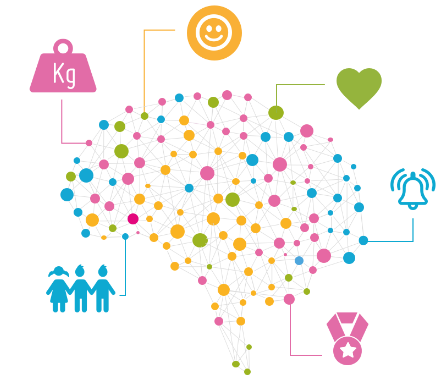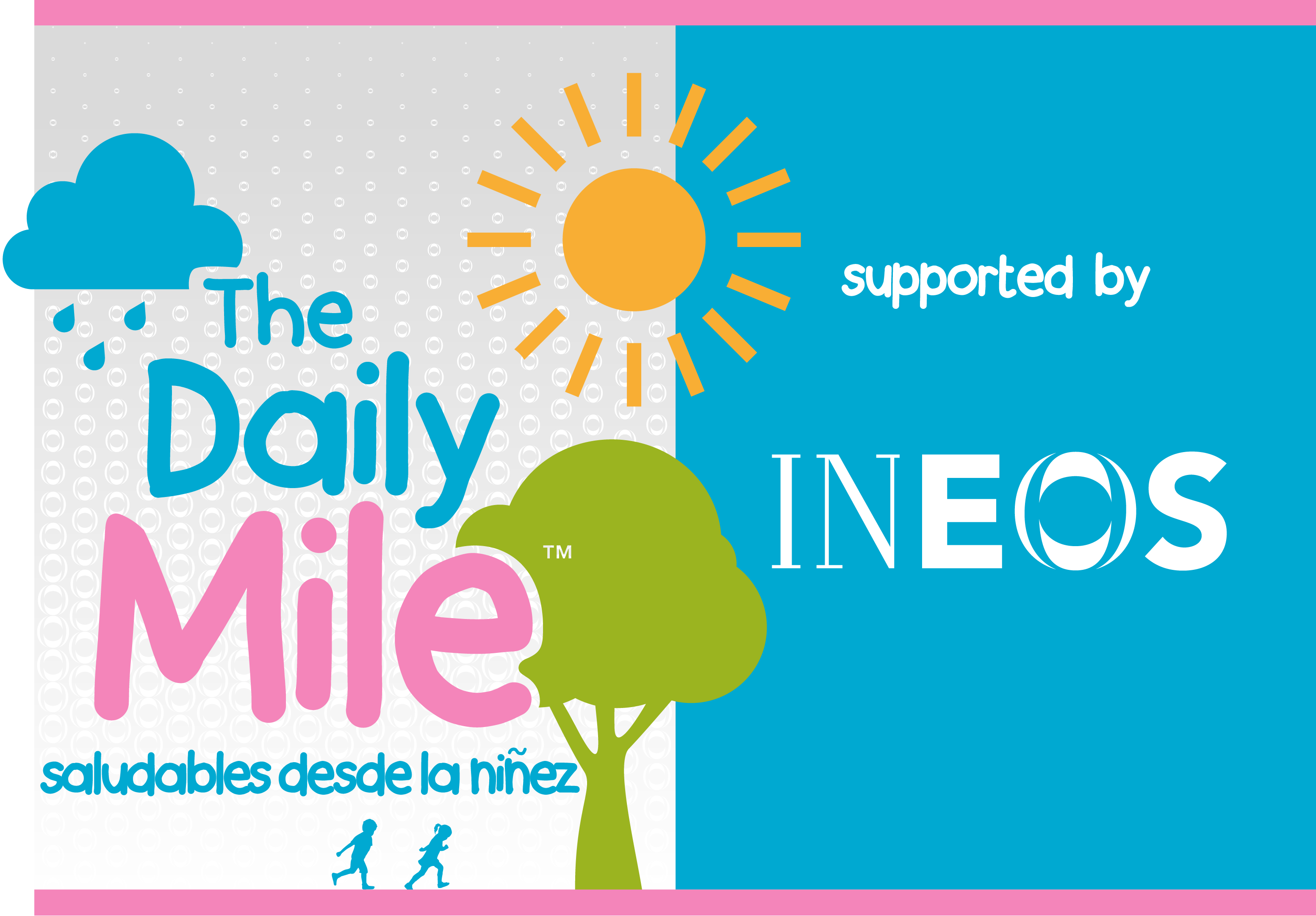La ciencia que apoya The Daily Mile
Todos sabemos que la actividad física es saludable, y este hecho es aplicable a The Daily Mile. La actividad física diaria aporta una gran variedad de beneficios en cuanto a salud y bienestar. Un creciente número de pruebas científicas apuntan al impacto positivo que tiene la iniciativa The Daily Mile sobre la salud de los niños y niñas. Para aprender más acerca de la ciencia que apoya The Daily Mile, lee a continuación.
Aprende más
La importancia de la actividad física
La ciencia ha demostrado ampliamente la importancia de la actividad física para mantener una buena salud física y mental. En el siguiente documento se describe el impacto positivo de la actividad física sobre la salud, el bienestar y el aprendizaje de los niños – y cómo The Daily Mile les permite obtener estos beneficios cada día.
Los beneficios de la actividad física – Cómo The Daily Mile puede ayudar
A medida que The Daily Mile se ha ido expandiendo, también lo ha hecho nuestro conocimiento sobre la iniciativa, ya que investigadores de todo el mundo han empezado a estudiar el impacto que tiene sobre la salud y el bienestar infantil. A continuación explicaremos los beneficios concretos que aporta The Daily Mile, citando las investigaciones publicadas. Si tiene alguna pregunta al respecto, no dude en ponerse en contacto con nosotros.
Beneficios de The Daily Mile
- Mejora la forma física de los niños (aumento del 9%)5,9,11,13, fuerza en las piernas (aumento del 5%)2 y composición corporal (reducción del 4% en la grasa corporal)9.
- Contribuye a que los niños alcancen un tercio de la actividad diaria recomendada por la OMS10.
- Puede mejorar la atención, el estado de ánimo y la memoria verbal (aumento del 7%) en los niños1.
- Es fácil de implantar y se adapta al contexto concreto de cada colegio de primaria3,5,12.
- Puede ayudar a que los niños se concentren mejor en clase3,4 y se sientan más felices1.
- Fomenta una relación positiva tanto entre alumnos como con el/la profesor(a)2,4,5,8.
- Puede contribuir a otros aspectos del plan de estudios, mejorando los resultados de aprendizaje4.
- Tiene un efecto positivo sobre el ambiente escolar12.
- Los niños dicen sentirse más tranquilos después de hacer The Daily Mile6.
- Mejora la actitud de los niños hacia la actividad física5.
- Puede ayudar a reducir la obesidad infantil; tiene un impacto positivo sobre el IMC, sobre todo entre las niñas; y supone una intervención rentable, especialmente para las niñas14.
¿Cómo puede ayudar The Daily Mile?
Ver más estudiosLa Fundació Daily Mile i INEOS Britannia celebren les Escoles Catalanes de cara a la 37.ªCopa Amèrica 2024
junio 14, 2024La Fundación Daily Mile e INEOS Britannia celebran las Escuelas Catalanas de cara a la 37.ª Copa América 2024
Nueva cooperación entre la Asociación Española contra el Cáncer y The Daily Mile
mayo 18, 2021Nuevo socio de colaboración: La Agencia Salud Publica de Cataluña y The Daily Mile
¡Más de 3.000.000 niños corren The Daily Mile!
enero 20, 2021Un estudio holandés de 12 semanas demuestra un resultado positivo sobre la capacidad aeróbica de los niños
International Journal of Environmental Research and Public Health¿Desea investigar sobre The Daily Mile?
Además de las investigaciones resumidas anteriormente, hay muchas universidades alrededor del mundo que están estudiando The Daily Mile en estos momentos, y cuyo trabajo está pendiente de publicarse.
Con el fin de fomentar un espíritu colaborativo en las investigaciones, y asegurarnos de poder seguir aprendiendo sobre el impacto de The Daily Mile sobre la salud y el bienestar infantil, nuestra Fundación coordina un Grupo Asesor de Investigación.
Si Ud. se está planteando investigar sobre The Daily Mile, por favor asegúrese de que su centro es consciente de nuestros Principios Básicos de Investigación y póngase en contacto con nuestra Coordinadora de Investigación.
Referencias para los beneficios de The Daily Mile
1. Universities of Stirling and Edinburgh: Booth JN, Chesham RA, Brooks NE, Gorely T, Moran CN. A citizen science study of short physical activity breaks at school : improvements in cognition and wellbeing with self-paced activity. BMC Med. 2020;18(62). doi.org/10.1186/s12916-020-01539-4
2. Doncaster & Bassetlaw Teaching Hospitals NHS Foundation Trust:Harris J, Milnes LJ, Mountain G. How ‘The Daily Mile’ works in practice: A process evaluation in a UK primary school. J Child Health Care. 2019. doi:10.1177/1367493519880049
3. Universities of Stirling and Edinburgh: Ryde GC, Booth JN, Brooks NE, Chesham RA, Moran CN, Gorely T. The Daily Mile: What factors are associated with its implementation success? Van Horn L, ed. PLoS One. 2018;13(10) doi.org/10.1371/journal.pone.0204988
4. King’s College London: Hanckel B, Ruta D, Scott G, Peacock JL, Green J. The Daily Mile as a public health intervention: a rapid ethnographic assessment of uptake and implementation in South London, UK. BMC Public Health. 2019;19(1). doi.10.1186/s12889-019-7511-9
5. University of Swansea:Marchant E, Todd C, Stratton G, Brophy S. The Daily Mile: Whole-school recommendations for implementation and sustainability. A mixed-methods study. Visram S, ed. PLoS One. 2020;15(2). doi:10.1371/journal.pone.0228149
6. Mulier Instituut: Slot-Heijs, J.J., Singh AS. The Daily Mile.; 2019 www.mulierinstituut.nl/publicaties/24601/the-daily-mile/
7. Mulier Instituut: Scholten, Vera: Collard D. Evaluatie van The Daily Mile.; 2017. www.kennisbanksportenbewegen.nl/?file=8106&m=1505397804&action=file.download
8. SCPHRP University of Edinburgh: Malden S, Doi L. The Daily Mile: teachers’ perspectives of the barriers and facilitators to the delivery of a school-based physical activity intervention. BMJ Open. 2019;9(3). doi:10.1136/BMJOPEN-2018-027169
9. Universities of Stirling and Edinburgh: Chesham RA, Booth JN, Sweeney EL, et al. The Daily Mile makes primary school children more active, less sedentary and improves their fitness and body composition: A quasi-experimental pilot study. BMC Med. 2018;16. doi:10.1186/s12916-019-1336-3
10. University of Leeds Beckett: Morris JL, Daly-Smith A, Archbold VS, Wilkins EL, McKenna J. The Daily Mile™ initiative: Exploring physical activity and the acute effects on executive function and academic performance in primary school children. Psychol Sport Exerc. 2019;45. doi:10.1016/j.psychsport.2019.101583
11. University of Torino:Brustio PR, Mulasso A, Lupo C, Massasso A, Rainoldi A, Boccia G. The Daily Mile Is Able to Improve Cardiorespiratory Fitness When Practiced Three Times a Week. Int J Environ Res Public Health. 2020;17(6):2095. doi:10.3390/ijerph17062095
12. University of Torino: Brustio PR, Mulasso A, Marasso D, et al. The Daily Mile: 15 minutes running improves the physical fitness of Italian primary school children. Int J Environ Res Public Health. 2019;16(20). doi:10.3390/ijerph16203921
13. Mulier Instituut:de Jonge M, Slot-Heijs JJ, Prins RG, Singh AS. The effect of The Daily Mile on primary school children’s aerobic fitness levels after 12 weeks: A controlled trial. Int J Environ Res Public Health. 2020;17(7). doi:10.3390/ijerph17072198
14. University of Birmingham: Breheny K, Passmore S, Adab P, et al. Effectiveness and cost-effectiveness of The Daily Mile on childhood weight outcomes and wellbeing: a cluster randomised controlled trial. Int J Obes. 2020. doi:10.1038/s41366-019-0511-0

